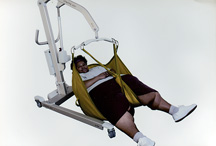YARMOUTH, Maine -- Not since the medical industry discovered baby boomers has a demographic attracted so much attention as the clinically obese. In the wake of numerous studies documenting America's weight problem as an epidemic, manufacturers have been scrambling to come out with product lines designed to serve this population.
"Bariatric" has become the new buzz word in the industry, as demonstrated by a slew of new products at last fall's Medtrade and by a flood of new promotions from vendors trying to capture a piece of this burgeoning category. Even Medicare has recognized the trend, assigning billable codes for products with higher weight limits.
While all this activity may signal new opportunities for HME providers seeking alternative sales niches, seasoned veterans like DuWayne Kramer recommend that prospective buyers use discretion and caution in their purchasing decisions.
"There are people out there trying to cash in on this market without providing a legitimate product that will actually help bariatric patients," said Kramer, president of Kansas City-based Burke/Leisure-Lift, which introduced one of the first heavy-duty hospital beds back in the early 1980s. "Just because a bed has a couple extra pieces of steel and a 650-lbs. capacity doesn't mean it's a true bariatric bed."
Product manager Jim Ernst echoed Kramer's view, adding that Burke has a lot more competitors now than it did just a few years ago.
"There are some who are doing a wonderful job, but there are others who are just jumping on the bandwagon who don't have a clue about what they're doing," he said.
As a company "at the head of the revolution," Burke not only offers beds with weight capacities of 800 and 1,000 lbs., it recently introduced the Impulse drive bed, a unit that allows hospitals to move patients from room to room.
Few manufacturers have been adding bariatric products to their repertoires faster than Mundelein, Ill.-based Medline Industries, which has gone from making a dozen products two years ago to more than 100 today. Its offerings include beds, wheelchairs, walkers, bath safety products, stretchers and scales that go up to 1,000 lbs.
"It is one of the fastest growing parts of our business, with sales up 60% over last year," said Dave Jacobs, president of Medline's Durable Medical Equipment division. "There is a distinct need for these products and it means good business for our dealers."
That this new generation of products is strong enough to support humans who weigh up to half a ton may seem like overkill, but Doug Francis, executive vice president of Port Washington, N.Y.-based Drive Medical says it's a sad reality.
"Look at the statistics - the obese population is going up and up," he said. "Weight limits have gone from 250 to 300 to 350 and now up to 1,000. Unfortunately, there are customers who need products with these weight limits."
Atlanta-based Graham-Field has busily rolled out a comprehensive array of bariatric products through its Lumex and E&J divisions and director of product management Angela Mayfield says it's just the beginning.
"This is just the first stage of a major new product initiative of specialized healthcare products for the bariatric patient," she said. "We are currently testing products that have even greater weight capacity so we can address the special needs of even heavier patients."
Still, not all suppliers are seeing the market take off. Avi Weiss, director of home healthcare for Springfield, Ill.-based distributor HD Smith, says his expectations have outstripped reality.
"There has been mild success in selling bariatric products, but I'm surprised it hasn't taken off faster," he said. "I don't think manufacturers have done enough to educate the retailer on how to sell it."




Comments